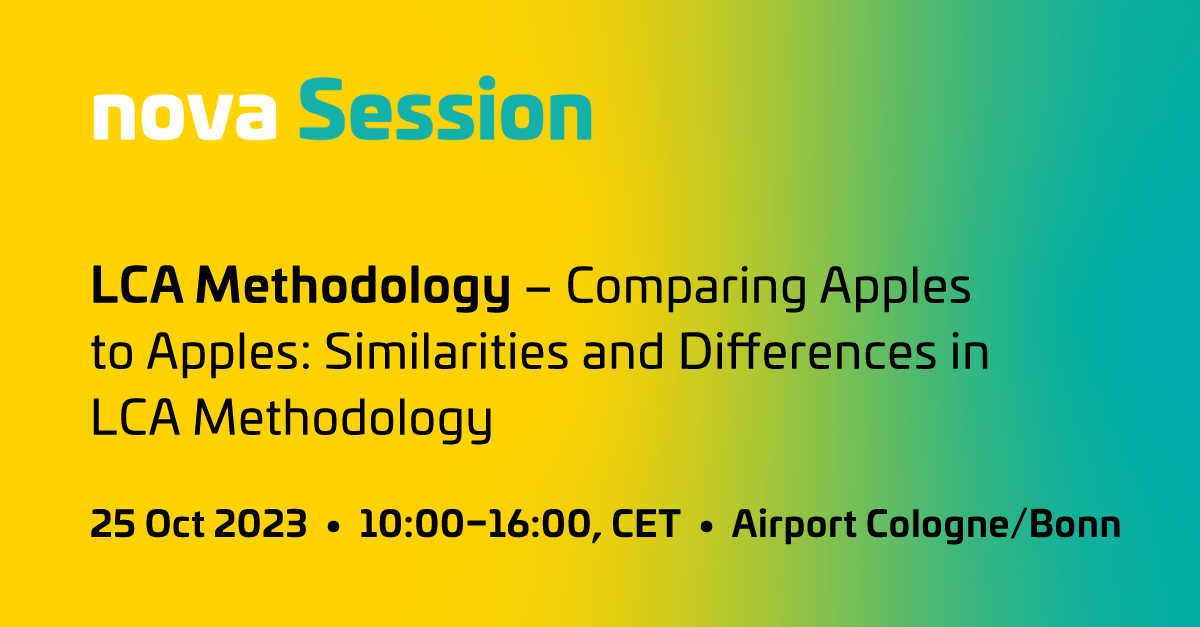
- This event has passed.
LCA methodology – Comparing Apples to Apples: Similarities and Differences in LCA methodology

Hosted by Dr. Matthias Stratmann, Ferdinand Kähler (nova-Institute)
Comparing apples to apples from a sustainability point of view is not so easy – Just as little as an effective implementation of the topic of sustainability assessment into business processes.
Two great topics for a “nova session” with sustainability experts from the nova-Institute supported by an external speaker from AllocNow.
Information on environmental impacts of products become more and more important. Sustainability is a megatrend, customers ask about Carbon Footprints and specific claims must be substantiated. Life Cycle Assessment (LCA) is the most recognized methodology to assess potential environmental impacts of products. However, the flexibility of LCA methodology and the fact that different standards exist make it very difficult to compare products on the basis of different studies. That is why the European Commission has, for example, initiated the Product Environmental Footprint (PEF), aiming to establish harmonised rules.
 Multiple frameworks and guidelines for conducting Life Cycle Assessments have been published over the years which are all applied in industry and academia. The objective of this session is to evaluate the frameworks and guidelines for the methodological choices which impact LCAs for products. The session will focus on where methodological choices of guidelines are similar to each other, where they are different and the implication of the methodological choices for the results of the LCA.
Multiple frameworks and guidelines for conducting Life Cycle Assessments have been published over the years which are all applied in industry and academia. The objective of this session is to evaluate the frameworks and guidelines for the methodological choices which impact LCAs for products. The session will focus on where methodological choices of guidelines are similar to each other, where they are different and the implication of the methodological choices for the results of the LCA.
A second emphasis will be placed on the integration of Life Cycle Assessments into business processes. LCA does not happen in companies in isolation. We live in times of digitalisation and Industry 4.0 where companies are supported by powerful ERP systems. We will show you the differences and similarities of the various requirements and challenges when it comes to LCA and digitalisation. The company AllocNow GmbH will present an example of how the integration of corporate data and sustainability assessments can look like.
Topics
- Sustainability Assessment and LCA
- Variety of standards for Life Cycle Assessment
- Methodological consistency and differences
- Integration and automation of LCA in business processes
Join us and learn more on how to conduct LCAs and how to integrate them into your business processes. The session addresses LCA users or other staff that is working on sustainability topics and can bring already some experiences with LCA application.
Program
25 October 2023, 10:00 – 16:00 h (CET: Central European Time), on-site
Hosts: Dr. Matthias Stratmann, Ferdinand Kähler (nova-Institute)
| 10:00 | Introduction and Welcome – Tour de Table |
| 10:30 | Relevant norms and standards for LCA Different use cases and applications of LCA |
| 11:00 | Methodological Aspects Part 1
|
| 12:30 | Lunch |
| 13:15 | Methodological Aspects Part 2
|
| 14:45 | Coffee Break |
| 15:00 | LCA in Industry – digitalization and automation |
| 15:10 | Case Study: AllocNow GmbH – Automated LCA and Sustainability Platform |
| 15:30 | Final Discussion |
| 16:00 | End of Session |


